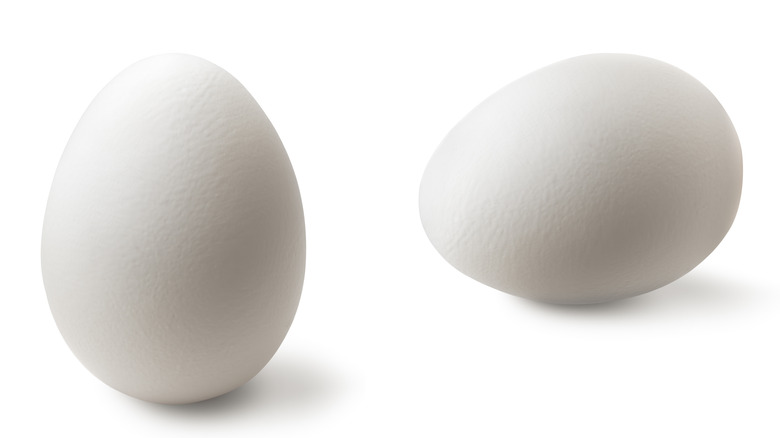Store Eggs Upside Down For Longer Lasting Freshness
Clever marketing and a catchy jingle have fooled many of us into thinking, "Brown eggs are local eggs, and local eggs are fresh." In reality, like humans, different chicken breeds lay eggs in different colors, and the eggshell's hue has nothing to do with its freshness or nutritional benefits. To determine its nutritional value, we should consider the chicken's diet, determine whether it was free-range, and focus on properly storing the eggs to maximize their freshness.
There are a few ways to keep eggs fresh longer. Unless you're lucky enough to have freshly laid eggs, supermarket eggs should be stored in the refrigerator. When hens lay eggs, there's a protective coating placed on them that allows the eggs to sit safely at room temperature without spoiling. However, the FDA requires that USDA-graded eggs be washed and sanitized, removing the coating so they must be kept below 40 degrees Fahrenheit to maintain freshness.
You may not have noticed, but typically when eggs are packed into a carton, they are placed with the blunt (wider) end facing down. While removing the eggs from the carton is unnecessary, storing them pointy side down is recommended to keep them fresh longer.
Why does that extend the egg's freshness?
There's an air pocket in the blunt end of the egg between the inner and outer shell membrane. The air pocket enlarges as the egg ages, which is why hard-boiled eggs made from older eggs are easier to peel than fresher ones.
Storing the egg pointy side down keeps the air pocket at the top and the yolk in the center, preventing the air pocket from rupturing and spoiling the egg. When you put the groceries away from the supermarket, you can manually turn each egg so the blunt side is down and the pointy side faces up. Or you can simply store the closed egg carton upside down in the refrigerator. When you need an egg, just turn the carton right side again and remove what you need.
Either way, keep eggs in their original carton and place them towards the back of the refrigerator, where it's consistently coldest. Avoid storing eggs on the fridge door where repeated opening and closing would affect the temperature.
How long can eggs stay at room temperature
Unwashed farm-fresh eggs can stay fresh on the counter for a few weeks, but refrigerating them will extend their shelf life. A day at room temperature equals a week in the fridge, so keep eggs chilled unless you are using them that day.
When a refrigerated egg is left out at room temperature, the shell begins to sweat. Since the shell is porous, any bacteria on the surface can transfer to the egg, increasing the risk of contamination from food-borne bacteria like Salmonella. You may be tempted to wash the eggs, but don't. The water can introduce bacteria into the egg. It's best to keep the eggs in the original carton and wash anything that comes in contact with it.
If you're a baker, you may wonder about all the recipes that call for room-temperature eggs. The FDA recommends keeping eggs out of the refrigerator for no more than two hours. Bacteria multiply faster in the "Danger Zone" when food sits between 40 degrees and 140 degrees Fahrenheit, but cooking eggs at 160 degrees Fahrenheit kills any hidden bacteria. So, while bringing baking ingredients to room temperature for a velvety batter or dough is critical, please don't leave them out all day. Place the eggs on the counter within two hours of baking, or less if the kitchen is hot.



